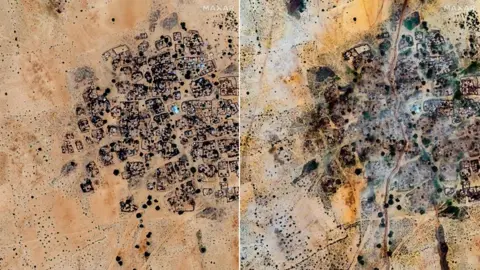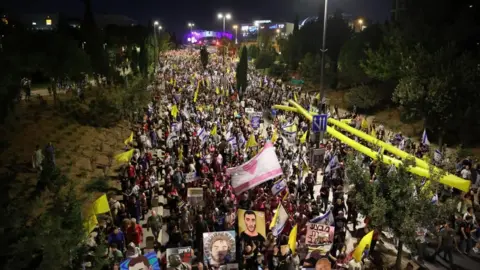An extensive earthen wall is being built around the besieged Sudanese city of el-Fasher and is intended to trap people inside, according to research from Yale University.
From satellite images, the university's Humanitarian Research Lab has identified more than 31km (19 miles) of berms - as the raised banks are known - constructed since May in territory outside the city occupied by the paramilitary Rapid Support Forces (RSF).
El-Fasher, under siege for more than a year, is the last major foothold in Darfur for the army, which has been battling the RSF since April 2023.
The Sudan Doctors Network has told the BBC the RSF is intensifying its offensive there and deliberately targeting civilians.
Yesterday there was a shelling in a civilian area down in the city centre that ended up killing almost 24 civilians and injuring 55 people, among them five women, Dr Mohamed Faisal Hassan, from the medics association, reported.
The attacks on the central market and residential areas were described as deliberate and heinous.
Dr Hassan noted that three days prior, a major hospital in el-Fasher was targeted, resulting in numerous casualties among patients and medical staff.
BBC analysis indicates that both sides in the conflict are using berms as a defensive strategy. However, Yale's HRL suggests that the RSF is creating a literal kill box around el-Fasher.
The HRL traced the construction of the earthen walls on a map, revealing ongoing construction of a semicircle barricade around the city.
Civilians trying to flee have reported being targeted and killed by RSF forces. Conditions for those remaining in el-Fasher are dire, with continuous bombardment, food scarcity, and limited access to medical care.
Humanitarian organizations have been unable to access el-Fasher for months, delivering a devastating blow to the roughly 300,000 residents. Many civilians express hopelessness, with attempts to escape fraught with danger and costs prohibitive.
As the situation deteriorates, calls for international intervention are becoming more urgent. El-Fasher's fall would represent a significant shift in control of Darfur, potentially leading to severe long-term implications for Sudan's future.




















